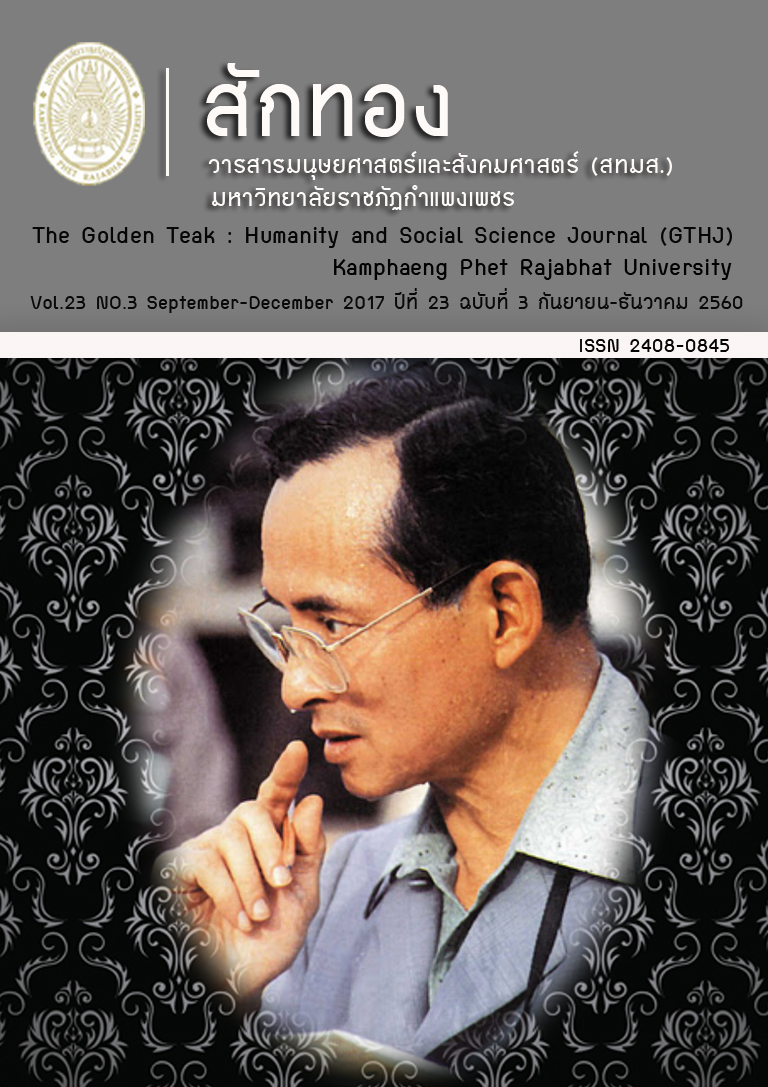บ้านธารปราสาท โนนอุโลก บ้านโนนวัด… จากภูมิปัญญาท้องถิ่นสู่การจัดการท่องเที่ยวตามวิถีเศรษฐกิจพอเพียง
Main Article Content
Abstract
บทคัดย่อ
การวิจัยนี้มีวัตถุประสงค์เพื่อ 1. ศึกษาพฤติกรรม การรับรู้ และความต้องการของนักท่องเที่ยวต่อการจัดการ
การท่องเที่ยวตามหลักปรัชญาเศรษฐกิจพอเพียง 2. ศึกษาศักยภาพแหล่งท่องเที่ยวเชิงวัฒนธรรมในอำเภอ
โนนสูง จังหวัดนครราชสีมา และ 3. เป็นแนวทางในการพัฒนาการจัดการการท่องเที่ยวเชิงวัฒนธรรมตามหลักปรัชญาเศรษฐกิจพอเพียง โดยมีกระบวนการวิจัยแบบผสมผสานระหว่างการวิจัยเชิงปริมาณ และการวิจัยเชิงคุณภาพ ดำเนินการเก็บข้อมูลด้วยแบบสอบถามพฤติกรรมการท่องเที่ยว การสัมภาษณ์ภาคีด้านการท่องเที่ยว การวิเคราะห์ข้อมูลด้วยเครื่องมือทางสถิติ ได้แก่ ค่าเฉลี่ย ร้อยละ และส่วนเบี่ยงเบนมาตรฐาน การถอดบทเรียนด้วยกระบวนการจัดการความรู้ และการวิเคราะห์ข้อมูลแบบอุปนัย ผลการวิจัย พบว่า (1) พฤติกรรม การรับรู้และความต้องการของนักท่องเที่ยวต่อการจัดการและการตลาดท่องเที่ยวตามหลักปรัชญาเศรษฐกิจพอเพียงอยู่ในระดับมาก เมื่อพิจารณาเป็นรายข้อพบว่า ด้านภูมิคุ้มกันและด้านคุณธรรมมีค่าเฉลี่ยความต้องการสูงที่สุด (2) ศักยภาพของแหล่งท่องเที่ยวตามหลักเศรษฐกิจพอเพียงทั้ง 3 ด้าน พบว่า แหล่งอารยธรรม “บ้านธารปราสาท” มีศักยภาพสูงที่สุดในทุกด้าน (3) แนวทางในการพัฒนาและจัดการการท่องเที่ยวเชิงวัฒนธรรมจังหวัดนครราชสีมาภายใต้กรอบการพัฒนา 5 ประการ ประกอบด้วย 1) การปรับปรุงการตลาดและผลิตภัณฑ์การท่องเที่ยว 2) การพัฒนานักท่องเที่ยวโดยการสร้างประสบการณ์ใหม่ให้นักท่องเที่ยวเก่า และแสวงหานักท่องเที่ยวรายใหม่ให้เข้ามาท่องเที่ยว 3) การพัฒนาองค์ประกอบด้านการท่องเที่ยว ด้วยการปรับปรุงระบบสาธารณูปโภคด้านการท่องเที่ยวให้เหมาะสมมากยิ่งขึ้น 4) การเชื่อมโยงด้านการท่องเที่ยวทั้งภายในและภายนอกชุมชน 5) การบริหารจัดการท่องเที่ยวภายใต้กลยุทธ์ความยั่งยืนและการจัดการความรู้ชุมชนโดยยึดหลักการมีส่วนร่วม
Ban Tarnprasart, Noen-U-Lok and Ban Non Wat… the Local Wisdoms to Sufficiency Economy of Tourism Management
ABSTRACT
This research was aimed: 1. to study the behavior, perceptions, and needs of tourists with regard to tourism management based on the sufficiency economy principle; 2. to examine the potential of cultural tourist attractions in Nonsung District, Nakhonratchasima Province, and 3. to be a guideline for developing and managing cultural tourist attractions based on sufficiency economy principles. This study applied a mixed research approach using quantitative and qualitative methods. Data were gathered using a questionnaire on tourism behavior and via interviews of tourism members. Data were analyzed using statistical measures including mean, percentage, and standard deviation along with analysis of the knowledge management process and inductive data analysis. The study results showed a number of insights. (1) Behavior, perceptions, and the needs of tourists with regard to tourism management and marketing based on sufficiency economy principles were at a high level overall. Meanwhile, considered by each aspect, immunity and morality had highest mean for the needs category. (2) The potential of tourist attractions based on three terms of the sufficiency economy principles indicated that “Ban Than Prasart” Archaeological Site had the highest potential for every aspect. (3) Guidelines for cultural tourist attraction development and management in Nakhonratchasima Province under the framework of five practices of development included: 1) improving markets and tourism products; 2) developing tourism by offering new experiences to old tourists and seeking out new tourists; 3) developing tourism components with public utilities improvement; 4) connecting tourism inside and outside the community, and 5) managing the tourism under sustainability strategy and regulating community knowledge with public participation.
Article Details
บทความที่ได้รับการตีพิมพ์เป็นลิขสิทธิ์ของวารสาร สักทอง : วารสารมนุษยศาสตร์และสังคมศาสตร์ สถาบันวิจัยและพัฒนา มหาวิทยาลับราชภัฏกำแพงเพชร
ข้อคิดเห็นใดๆ ที่ปรากฎในวารสารเป็นวรรณกรรมของผู้เขียนโดยเฉพาะ ซึ่งมหาวิทยาลัยราชภัฏกำแพงเพชรและบรรณาธิการไม่จำเป็นต้องเห็นด้วย


